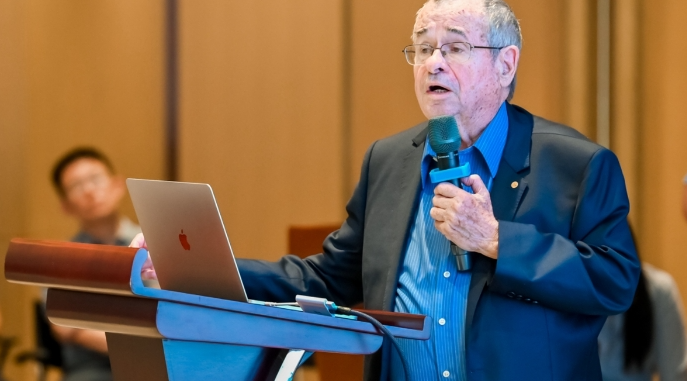Shenzhen, China — A seminar aimed at bolstering collaborative efforts in the biomedicine industry between Shenzhen and Hong Kong was held Friday at the Shenzhen-Hong Kong International Science and Technology Park, located in the Hetao Shenzhen-Hong Kong Science and Technology Innovation Cooperation Zone. The event attracted around 120 participants, including experts, entrepreneurs, researchers, and industry insiders, underscoring the growing synergy between the two cities in the field of biotechnology.
Among the key speakers was Nobel laureate Prof. Arieh Warshel, an American-Israeli chemist awarded the Nobel Prize in Chemistry in 2013. Prof. Warshel, who currently serves as a distinguished professor at The Chinese University of Hong Kong, Shenzhen (CUHK-SZ), delivered an insightful speech on the application of computer simulations and physical analysis in the fight against diseases.
Prof. Warshel, with his extensive experience in drug development and biological mechanism studies through computational modeling, founded the Warshel Institute for Computational Biology at CUHK-SZ in 2017. The institute, one of the world’s leading centers for computational biology, plays a crucial role in nurturing talent in bioinformatics and systems biology.
“I enjoy what I do. It is rewarding to witness the development and growth in this field,” Prof. Warshel said during his speech, highlighting Shenzhen’s rapid advancements in science and technology. He praised the city for its energetic and attractive environment, noting the impressive progress of CUHK-SZ, which has emerged as a leading university within a decade.
The seminar also featured Prof. Ye Dequan, director of the CUHK-SZ Futian Biomedical Innovation R&D Center, who provided an in-depth overview of the center’s activities since its establishment in 2020. The center is dedicated to the research and development of new drugs and disease diagnostics and has developed four R&D platforms offering 15 distinct services.
To date, the center has filed 17 domestic patent applications, of which five have been granted. Additionally, it has submitted five applications under the Patent Cooperation Treaty, reflecting its commitment to innovation and intellectual property development.
The center has forged strategic collaboration agreements with 20 biomedical institutes across the Guangdong-Hong Kong-Macao Greater Bay Area, including partnerships with major industry players like Tencent, HaploX, China Resources Biopharmaceutical, and XtalPi.
Prof. Ye emphasized the significance of the Hetao Shenzhen Park in facilitating collaboration between companies and research institutes. “By leveraging resources from university-based basic research and conducting studies that align with societal needs, we can serve as a bridge that connects scientific research to the market,” he said.

